in-1
(Latin: no, not [ig-, il-, im-, ir-])
This in-, "not", becomes i- before gn, as with "ignore"; il- before l, as with illiterate; im- before b, m; and p, as with imbalance, immiscible, impecunious; and ir- before r, as with irrefragable.
Don't confuse this Latin prefix, in-1, meaning "not", with another Latin prefix in-2 meaning "in, into, within, inside, on, toward" or with the prefix for English-origin words in-3 meaning "in, into; within".
ignoble (adjective), more ignoble, most ignoble
1. A reference to not being of noble birth, reputation, or position.
2. Relating to being without honor, character, or worth.
2. Relating to being without honor, character, or worth.
ignominious (adjective); more ignominious, most ignominious
1. A reference to someone or something appearing shamefully weak and ineffective or having a total loss of dignity and pride: It was an ignominious and a disgraceful retreat for the team after losing the game because they were always the best in the district.
2. Descriptive of someone who deserves condemnation and contempt: The ignominious behavior Greg showed toward his friend was totally wrong and despicable.
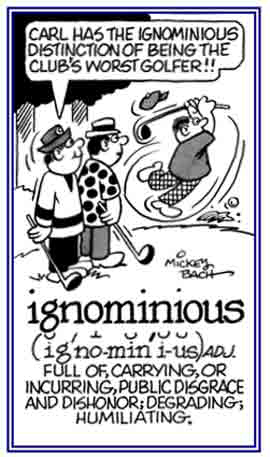
© ALL rights are reserved.
Go to this Word A Day Revisited Index
2. Descriptive of someone who deserves condemnation and contempt: The ignominious behavior Greg showed toward his friend was totally wrong and despicable.

Go to this Word A Day Revisited Index
so you can see more of Mickey Bach's cartoons.
ignominiously (adverb), more ignominiously, most ignominiously
1. Descriptive of a total loss of dignity and self-respect or an incurring of public disgrace.
2. A reference to a shameful act.
2. A reference to a shameful act.
1. A great personal dishonor or humiliation: Imagine the ignominy of going into the classroom in the morning without having pants on!
2. A shameful or disgraceful action, conduct, or character: After causing the accident, running away, and being caught afterwards, Ted suffered the ignominy of having to go to the police station in the police car and having to pay a huge fine.
3. Etymology: from Latin ignominia; from French ignominie; literally, "without a name".
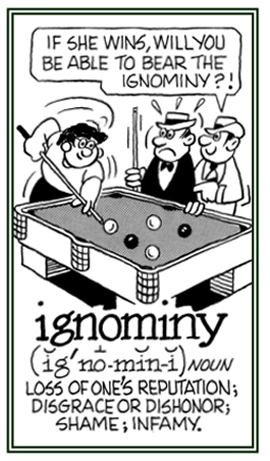
© ALL rights are reserved.
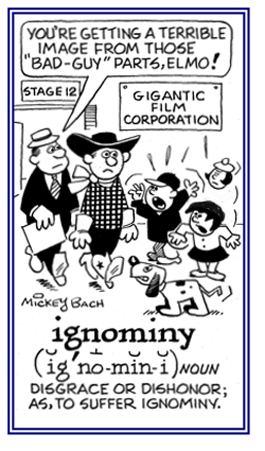
© ALL rights are reserved.
Go to this Word A Day Revisited Index
so you can see more of Mickey Bach's cartoons.
2. A shameful or disgraceful action, conduct, or character: After causing the accident, running away, and being caught afterwards, Ted suffered the ignominy of having to go to the police station in the police car and having to pay a huge fine.
3. Etymology: from Latin ignominia; from French ignominie; literally, "without a name".


Go to this Word A Day Revisited Index
so you can see more of Mickey Bach's cartoons.
so you can see more of Mickey Bach's cartoons.
1. Someone who has an extreme lack of knowledge: To label or to indicate that someone is an ignoramus, is saying that he or she is stupid or uneducated; however, it can also mean that a person just doesn’t know the real facts about certain things.
2. Etymology: from Latin ignorare, "not to know, to misunderstand, to disregard"; from ignarus, "not knowing, unaware"; i- (variant of in-, "not" + gnarus, "aware, acquainted with".
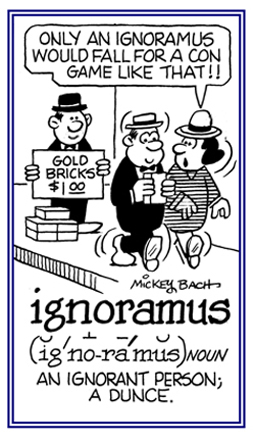
© ALL rights are reserved.
Go to this Word A Day Revisited Index
2. Etymology: from Latin ignorare, "not to know, to misunderstand, to disregard"; from ignarus, "not knowing, unaware"; i- (variant of in-, "not" + gnarus, "aware, acquainted with".

Go to this Word A Day Revisited Index
so you can see more of Mickey Bach's cartoons.
1. A lack of knowledge, education, learning, information, etc.
2. Unawareness of something, often of something important; uninformed.
2. Unawareness of something, often of something important; uninformed.
There is one thing to be said about ignorance—it sure causes a lot of interesting arguments.
ignore (verb), ignores; ignored; ignoring
To refuse to pay attention to; to disregard; refusal to recognize.
1. Someone who is unable to read or write: Susan was an illiterate who did not know the alphabet, let alone competent enough to peruse the contents of a text.
2. Anyone who has or demonstrates having very little or no education: In some parts of the world there are many illiterates who have had little or no formal or proper schooling.
2. Anyone who has or demonstrates having very little or no education: In some parts of the world there are many illiterates who have had little or no formal or proper schooling.
illiterate (adjective), more illiterate, most illiterate
1. Conveying a lack of culture; especially, in language and literature.
4. Displaying an inadequate amount of knowledge in some particular field or area.
4. Displaying an inadequate amount of knowledge in some particular field or area.
illiterately (adverb); more illiterately, most illiterately
Descriptive of how someone is not able to read or to write: Caren had very little formal education because of her mental ailments which resulted in her being illiterately ignorant when speaking or reading.
A limited knowledge, experience, or culture, especially in some particular field: Frank had very little experience or appreciation for classical music because of his illiterateness.
imbalance
immaculate (adjective); more immaculate, most immaculate
1. A reference to something being impeccably clean; spotless: Shanna put on an immaculate apron before starting to work in her kitchen.
2. Descriptive of a person who is free of bad characteristics; pure: The saint had an immaculate reputation for her work among the poor and homeless people.
3. Relating to something which is free from faults or errors: The football team played an immaculate game, committing no misplays or fouls.
4. Referring to plants or animals which have no markings: The new bird Jim spotted in the forest had a smooth immaculate black body with no flecks, dapples, streaks, or stripes.
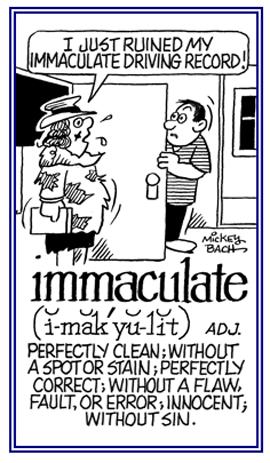
© ALL rights are reserved.
Go to this Word A Day Revisited Index
2. Descriptive of a person who is free of bad characteristics; pure: The saint had an immaculate reputation for her work among the poor and homeless people.
3. Relating to something which is free from faults or errors: The football team played an immaculate game, committing no misplays or fouls.
4. Referring to plants or animals which have no markings: The new bird Jim spotted in the forest had a smooth immaculate black body with no flecks, dapples, streaks, or stripes.

Go to this Word A Day Revisited Index
so you can see more of Mickey Bach's cartoons.
immature
immovable (adjective), more immovable, most immovable
1. Incapable of moving; motionless: The very old rusty car was immovable, so it it had to be towed away.
2. Insusceptible of changing one's attitude about something; steadfast: Judy was totally immovable and determined in her opinion that Jack was the love of her life.
3. Inability of being transported; firmly fixed: A mountain is certainly an immovable object!
2. Insusceptible of changing one's attitude about something; steadfast: Judy was totally immovable and determined in her opinion that Jack was the love of her life.
3. Inability of being transported; firmly fixed: A mountain is certainly an immovable object!
Showing page 1 out of 2 pages of 24 main-word entries or main-word-entry groups.

